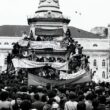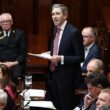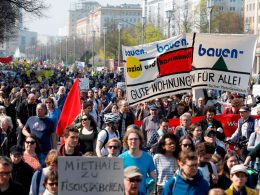A report published by non-governmental foundation, Front Line, examining human rights in respect of the Corrib Gas dispute, raises serious issues regarding the policing of the project and in relation to the project itself. Front Line is an international foundation established in Ireland in 2001, concerned with the rights of those who can be considered human rights defenders. The report finds that according to the United Nations definition, those involved in peaceful dispute against Shell may be categorised as human rights defenders.
Issues such as the highly contentious planning and development of the gas works are analysed and criticised within the report, as is the interaction between protestors and police, and the actions of the private security firm employed by Shell, IRMS.
Among the findings, the report highlights the sometimes disproportionate responses of the gardaí to protest, for example, an instance in 2006, when protestors were blocking a road, gardaí threw several people off the road and into ditches. In relation to one of the most controversial incidents in the dispute, the allegations made by Willie Corduff that he was assaulted by gardaí and IRMS security in April last year, the report could not make a conclusive statement in relation to assault by gardaí, but found in relation to the security guards, that Corduff had been set upon and kicked. It also stated that he had been only semi-conscious when IRMS guards had come upon him; contrary to statement made by the security firm. Further, in relation to this case, the report raised serious questions about the subsequent garda inquiry into the matter and recommended that Willie Corduff’s complaint be re-investigated by gardaí not based in Mayo.
Other recommendations within the report include the granting of permission to the Garda Ombudsman Commission to investigate policies and practices in relation to the Shell dispute. Permission was originally denied to the Commission in 2007 by then Minister for Justice, Brian Lenihan. The report also recommends the appointment of a human rights observer agreed upon by NGOs to advise on human rights issues in the Shell dispute.
The implications of this report are clearly very important in considering the democratic right to protest in relation to the Corrib gas dispute, and indeed, throughout Ireland as a whole. The report also exposes the pro-big business agenda of the capitalist political establishment and how they have used the Gardai to ensure the billion euro Shell project continues as smoothly as possible.












